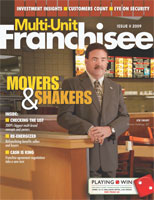One Size Doesn't Fit All: Do Franchisors Market To And Support Multi-Unit Franchisees Differently?
In the 20th century (some of you might remember that more stable and predictable period), multi-unit franchising was not much of a factor. Sure, there were multi-unit operators, but by and large franchisors didn't really put much emphasis on them. Those that did generally focused on growing their own, not wanting to invite franchisees in from other systems, and certainly not wanting to share their own.
The world has changed a lot in the past nine years. At some point in 2005 or 2006, multi-unit operators started controlling the majority of franchised units in the U.S. Not only was that significant, it also was surprising, given the number of new brands that have started in this decade, most of which sought out first-time franchisees. In turn, franchisees, even if they bought into a multi-unit program, started with just one unit and until they added a second unit were, by definition, single-unit franchisees.
We all have been part of this explosion of new franchise brands, some of them completely new concepts by inexperienced franchisors, some of them new concepts by experienced franchisors, and some of them extension concepts from existing brands. Clearly, franchisors began changing their strategy of seeking out such operators for such a trend to have resulted. But did franchisors change their programs as well, to reflect the differences that experienced franchisees represent?
The answer to that question is unclear, hence my desire to frame it in rhetorical terms. The basic assumption is that there are different needs for what perhaps could be three different types of franchisees: 1) single-unit owner-operator franchisees (who start out by definition as inexperienced); 2) operators with no previous franchising experience but a desire to become multi-unit franchisees; and 3) experienced multi-unit franchisees from other systems. If that assumption is correct, then there should be some evidence that franchisors adjust their programs for these three types of potential franchisees.
Let's start with the development process. We know franchisors are marketing to multi-unit franchisees because we work closely with many franchisors to help them reach this increasingly attractive category. We also know that they have developed marketing materials to appeal to the differing interests of multi-unit franchisees. However, we haven't heard about many Discovery Day programs that have been modified when an experienced multi-unit operator is invited. While this type of franchisee may be handled on an exception basis, it is hard to envision such a potential candidate sitting through the same discussions with a person completely new to franchising.
We often look at training program differences among brands. From our vantage point, most training programs do not appear to reflect modifications for the differing needs of the three types of franchisees described above. Perhaps the experienced multi-unit operators coming from other systems are being handled on an exception basis, although we suspect there is little being offered in the way of practical changes when designing training programs for these three different types of franchisees within a specific brand.
This is particularly true for the inexperienced and single-unit operators that have or desire to buy into a multi-unit program. Almost all training programs are geared to helping an inexperienced operator learn to run one unit. Very little training appears to be designed to help an operator graduate from a single unit or a smaller multi-unit operator grow into a larger, more sophisticated multi-unit operator. In most cases, it appears to be a survival of the fittest strategy, even though many franchisors are selling multi-unit packages in the hope they will succeed.
For purposes of clarity, I will make a distinction here between a smaller, family-type franchisee business with from one to a few units and a larger, more corporate-type franchisee business that has grown to the point of needing a layer of management between the owner and the unit operations. I am not aware of any franchisor training programs with modules that prepare a franchisee for that transition. Yet most franchisors highly prize the corporate franchisee operators from other systems. Again, we know this because we get a lot of contact list inquiries for just those types of operators.
Field support is the next logical area to consider. Historically, franchisors have been strongly focused on the single-unit operator's growth curve to becoming a successful franchisee. As franchisees expanded from one to many units within one system, it appears franchisors have, for the most part, either stayed ahead of franchisee operational needs over time as franchisee businesses became more complex or, at the very least, stayed out of the way.
It may well be that training and field support programs are starting to catch up to development in support of the broad corporate strategy shift for many brands toward attracting, preparing, and overseeing multi-unit franchisees. It seems to me that the franchisors that have made obvious changes in their programs would be more appealing to experienced multi-unit franchisees. This should be even more important to inexperienced franchisees that want to become multi-unit operators, because their educational needs are greater.
At the very least, any observable concerted efforts in this regard by franchisors should be a clear signal of their understanding of what multi-unit franchising is all about. And that may be the best type of marketing a franchisor can do to attract and retain the group of franchisees that now control the majority of all franchised units.
Darrell Johnson is President and CEO of FRANdata, an independent research company supplying information and analysis for the franchising sector since 1989. He can be reached at 703-740-4700 or [email protected].
Share this Feature
Recommended Reading:
FRANCHISE TOPICS
- Multi-Unit Franchising
- Get Started in Franchising
- Franchise Growth
- Franchise Operations
- Open New Units
- Franchise Leadership
- Franchise Marketing
- Technology
- Franchise Law
- Franchise Awards
- Franchise Rankings
- Franchise Trends
- Franchise Development
- Featured Franchise Stories
FEATURED IN

Multi-Unit Franchisee Magazine: Issue 2, 2009

$211,400
$200,000





 The multi-unit franchise opportunities listed above are not related to or endorsed by Multi-Unit Franchisee or Franchise Update Media Group. We are not engaged in, supporting, or endorsing any specific franchise, business opportunity, company or individual. No statement in this site is to be construed as a recommendation. We encourage prospective franchise buyers to perform extensive due diligence when considering a franchise opportunity.
The multi-unit franchise opportunities listed above are not related to or endorsed by Multi-Unit Franchisee or Franchise Update Media Group. We are not engaged in, supporting, or endorsing any specific franchise, business opportunity, company or individual. No statement in this site is to be construed as a recommendation. We encourage prospective franchise buyers to perform extensive due diligence when considering a franchise opportunity.